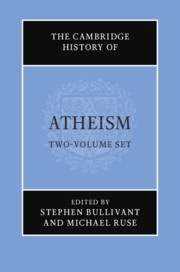Book contents
- The Cambridge History of Atheism
- The Cambridge History of Atheism
- Copyright page
- Dedication
- Contents
- Acknowledgments
- Contributors
- Introduction
- Part I Preliminaries
- Part II Atheisms in History
- Part III Reformation, Renaissance, Enlightenment
- Part IV Classical Modernity: Philosophical and Scientific Currents
- Part V Classical Modernity: Social and Political Currents
- 23 The French Revolution
- 24 Freethinkers, Atheists, and Anticlericals: Spanish American Struggles for Independence
- 25 Marx and Marxisms
- 26 Nineteenth-Century Russia
- 27 Secularism and Humanism
- 28 Bertrand Russell
- 29 Robert Ingersoll
- 30 Early Women’s Movement
- 31 Early African American Secularism
- Part VI Twentieth and Twenty-First Centuries: Intellectual and Artistic Currents
- Part VII Lived Atheism in the Twentieth- and Twenty-First Centuries: Case-Studies
- Part VIII Emerging Atheisms in the Twenty-First Century
- Part IX Conclusion
- Index
- References
25 - Marx and Marxisms
from Part V - Classical Modernity: Social and Political Currents
Published online by Cambridge University Press: 25 September 2021
- The Cambridge History of Atheism
- The Cambridge History of Atheism
- Copyright page
- Dedication
- Contents
- Acknowledgments
- Contributors
- Introduction
- Part I Preliminaries
- Part II Atheisms in History
- Part III Reformation, Renaissance, Enlightenment
- Part IV Classical Modernity: Philosophical and Scientific Currents
- Part V Classical Modernity: Social and Political Currents
- 23 The French Revolution
- 24 Freethinkers, Atheists, and Anticlericals: Spanish American Struggles for Independence
- 25 Marx and Marxisms
- 26 Nineteenth-Century Russia
- 27 Secularism and Humanism
- 28 Bertrand Russell
- 29 Robert Ingersoll
- 30 Early Women’s Movement
- 31 Early African American Secularism
- Part VI Twentieth and Twenty-First Centuries: Intellectual and Artistic Currents
- Part VII Lived Atheism in the Twentieth- and Twenty-First Centuries: Case-Studies
- Part VIII Emerging Atheisms in the Twenty-First Century
- Part IX Conclusion
- Index
- References
Summary
Karl Marx’s atheism is well known, even if his criticism of religion has more often than not been misconstrued. The distortions to his critical theory of religion stem from common misperceptions of the philosophical, political, and cultural context in which key statements on religion were formulated – and exacerbated by interpretations of his work that trade in anachronisms. The subsequent history of Marxism’s attitude to religion (and Marxism’s reading of Marx’s texts on religion), has itself been shaped by the different contexts in which Marxism has been either a revolutionary social movement, or a state ideology in which atheism has become part of the Marxist confession of faith. Marx’s atheism is multifaceted; some aspects are relatively banal, others appear either antiquated or naive; the criticism of religion formed at the nexus of his politics and dialectical thinking continue to provide a stimulating starting point and sounding board for thinking about religion today.
- Type
- Chapter
- Information
- The Cambridge History of Atheism , pp. 465 - 481Publisher: Cambridge University PressPrint publication year: 2021



